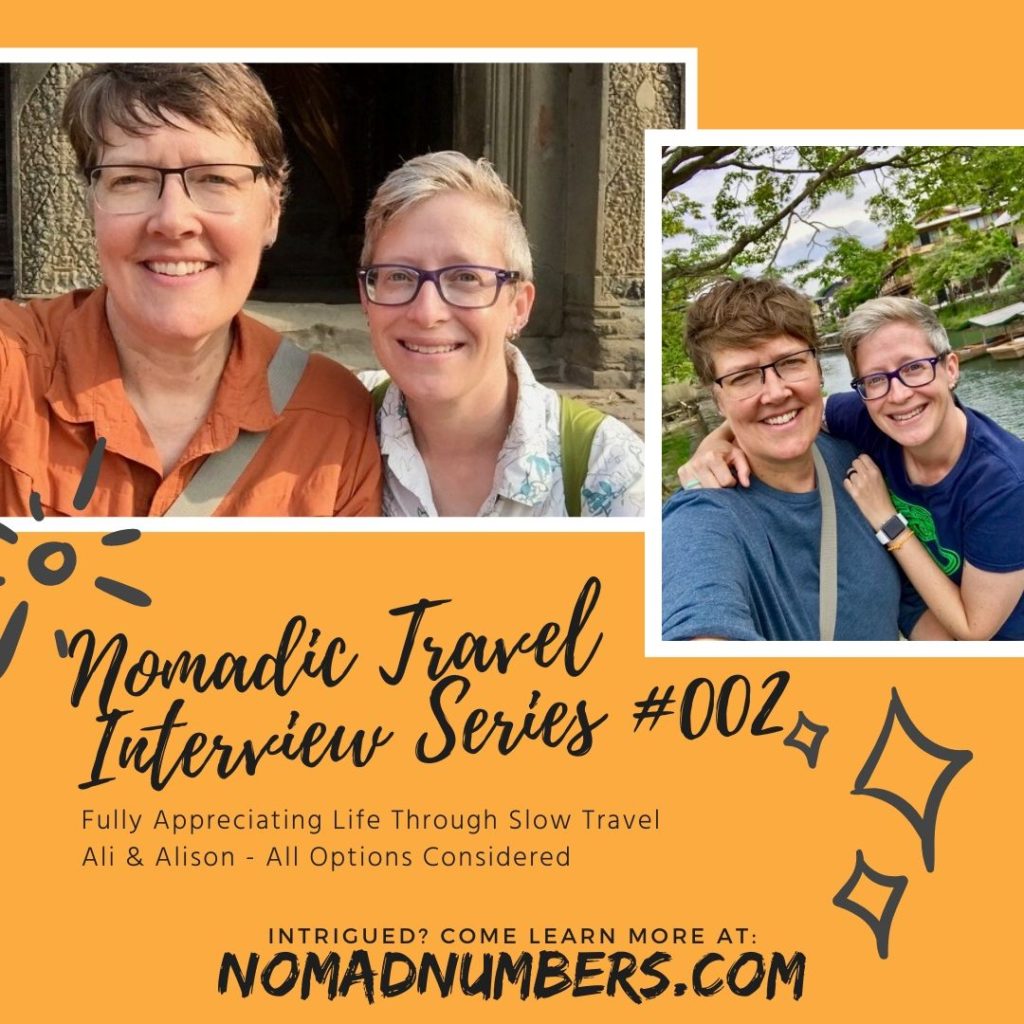
This interview is part of our interview series, where we curate stories of regular people that decided to design a life they love. (click here to learn more).
Ali & Alison from AllOptionsConsidered.com
Some links to the products mentioned below are affiliate links, meaning that if you click and make a purchase, Nomad Numbers may receive a commission at no additional cost to you. For more information please review our disclaimer page.
We stumbled upon Ali & Alison’s journey through their instagram feed and we immediately connected with them. They are like-minded people that decided to embrace nomadic living as part of their lifestyle and this is why we decided to reach out to them to write this interview.
Both Ali & Alison grew up in the US and met each other in 2004 in Seattle, Washington. Back in Seattle their typical day revolves around work since they were both gone for their jobs 50-60 hours per week.
They had their wake up call when Alison ran their numbers against the typical FIRE calculation of 25x annual living expenses in July of 2017 and realized they had reached their financial independence number. By becoming nomadic they can now separate themselves from their career-focused lives and the urge to participate in lifestyle inflation. They have taken their curiosity to explore new places, which used to be funneled into a vacation just once every 2 years, and made that into their full-time lifestyle.
Let’s hear from Ali & Alison!
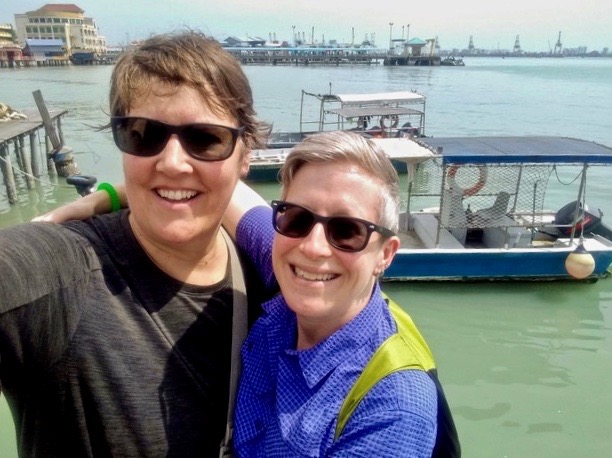
Tell us about yourself: Who are you? Which country do you come from/call home?
Ali & Alison (A&A): We are Ali and Alison Walker, and we are currently 45 and 56 years old. We met in Seattle, Washington in 2004 and married in Canada in 2006. We started traveling full time at the end of 2018 so our home is wherever we happen to be at the moment. We still claim Seattle as our legal residence for taxes and voting purposes but we definitely don’t live there anymore.
Lifestyle change
What does a typical day in your life look like for you today? And how does it differ from your lifestyle before?
A&A: Now that we are retired, a typical day includes spending about two hours reading in the morning with some coffee or tea. Then we take a walk and talk about whatever is on our minds and what we are interested in at the moment. Then we have lunch and work on our projects. For Alison that means checking the market and working on a money project for us or someone else. For Ali that means learning about the city and country we are in or researching some other places we want to travel to. And then we both do some writing. Every few days we have a video chat with a friend or family member. We often take another walk in the afternoon. Then we cook dinner together. At the end of the day we sometimes watch a show on Netflix or we just read some more, and we usually go to sleep around 10pm.
Our current lifestyle is completely different from how it was before FIRE and full time travel. Alison used to leave the condo around 5:30 am to go to work and she’d review our investments for an hour before clocking in for her job. She usually got home around 5pm. Ali used to leave the condo around 7:00 am for work and came home around 6:00 pm. We tried to cook dinner as often as possible but we ended up getting take-out a lot of the time. Then it was time to go to sleep and do it all over again. We often worked on weekends as well and tried to fit in a longer walk on the weekend. As for travel we planned a big vacation every 2 years.
You daily agenda seems to have drastically changed since you retired from your 9-5. What would you say is now the key factor driving the choice you are making daily? How has this change from before?
Check out the infographic below to contrast how A&A’s priorities have changed before and after their nomadic shift.
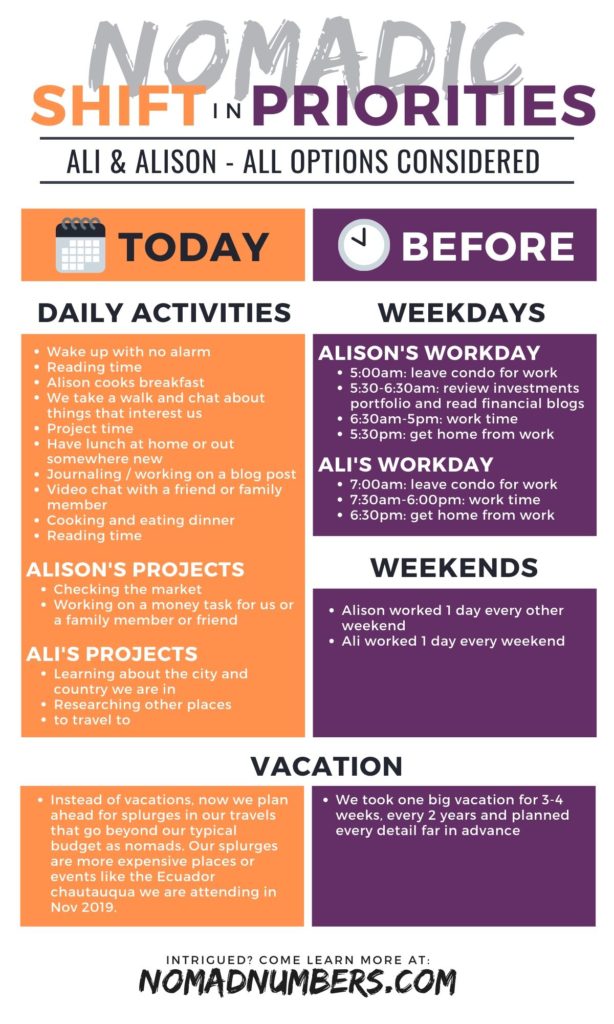
What led you to decide to change your lifestyle?
A&A: We were spending most of our time and energy on our jobs and that wasn’t creating a sense of happiness or fulfillment in our lives. We wanted to retire early so we could spend more time together and focus on things that we enjoyed. We had a beautiful condo and good jobs in Seattle. We realized we could be financially independent if we sold our condo, invested that money, and moved to a lower cost of living area as renters but there was no place we could think of that we wanted to live in full time. So we decided to trade our career-focused lives and clutter for a life spent together exploring other places and experiencing other cultures.
Since you no longer have to go to an office to receive income, has the definition of “work” changed for you and can you explain what “work” project you are focusing on at the moment?
A&A: “Work” seems to have a negative connotation to it because we are used to the idea that you have to go to work to make money to live your life. Now that we have retired early, we don’t need to do any “work” to receive income we just let our investments work on their own while we occupy ourselves with projects and other things throughout the day. The work or projects we like to focus on during the day are not intended for creating income, they could be anything from doing laundry to writing a story for our blog, or we might spend the whole day walking around whatever city we are in. At the moment Alison is pretty focused on our year end tax planning, and Ali is more focused on travel planning for the last two months of 2019.
Now that you are spending more time together, are there any challenges with spending 24/7 with your spouse? Was there any adjustment you made to your schedule to keep a healthy balance.
A&A: We really enjoy spending time together, and we don’t have any issue with being together 24/7. Sometimes one of us wants to take a walk when the other doesn’t, or one of us wants to spend hours cooking something complicated on our own, or one of us wants to go to the store when the other is busy, etc. When we are visiting family we often go do things with a sister or niece or nephew on our own. But we enjoy spending most of our time together. We have been happily married for over 13 years now so we know how to make room for each other. One of the most important things we do on a daily basis is to try not to interrupt each other when one of us is engrossed in something. We are very comfortable being in the same space while still being completely lost in our own heads and our own interests. We really did retire early for the purpose of spending more time together and making that change has definitely been a huge success for our relationship.
How long did it take you to become financially free? Why did you decide to reach FI? What were some of the challenges you had to face along the way?
A&A: When we got together in 2004 we immediately started talking about money and retirement, and we decided right away that we wanted to retire together. Alison believed we wouldn’t be able to retire until she was 65, and worried it could take another 10 years beyond that because it was hard for her to imagine that we could build enough wealth to stop working. In the beginning we were focused on building as much wealth as possible in our 401k’s, and then we also started investing in individual stocks in a joint brokerage account. We really enjoyed working with individual stocks but that was a very time consuming process for us and it was also stressful to be concerned with the normal ups and downs of the market on a daily basis. After that we became really excited about investing in real estate to generate passive income and we had two rental properties for a few years, but they were never cash positive so eventually we gave up on that idea. In 2012 we decided to simplify and downsize our lives, and that’s when we really started to gain momentum towards financial independence. We first heard about the FIRE movement in 2014 and that gave us a new vocabulary and new ideas for “early retirement” which caused a significant mindshift for both of us. Once we believed early retirement was truly possible we set our FIRE number and focused on achieving it. The final step to reaching financial independence was leaving our high cost of living neighborhood. Our condo in Seattle was diverting too much of our investable income away from more productive investment vehicles, so we sold our condo and that brought us to our FIRE number of 33x our annual living expenses. We really stumbled our way to FIRE, and retired forever in 2018 at ages 44 and 54.
What did your friends and family think of your plan to become financially free? What did they think when you announced to them that you will be quitting your day to day job and leaving the US to travel/relocate?
A&A: Our work friends didn’t believe us when we said we were quitting our jobs and retiring, they thought we were just taking a break before switching to new jobs. A lot of people had trouble understanding that we didn’t feel a need to be employed in order to have a sense of purpose or accomplishment. Our decision to stop working and leave Seattle was shocking for a lot of people and of course the fact that it seemed really sudden also made it hard for people to understand. But we have worked hard on the relationships in our lives with close friends and family, so we felt really supported and encouraged by the people we are closest to when we announced that we wanted something completely different for ourselves. Our families and close friends were initially worried when we said we were giving up our home and lives in Seattle. Now that a year has passed our family members are happy because we are spending more time with them now than we used to, and our close friends and family can all see that we are safe and happy in our new lives and we can maintain our close relationships even if we aren’t living nearby.
Tell us one belief that is held up by society as ‘common sense’ but that you think is ridiculous/silly/backward and why.
A&A: We do not believe that a person has to own a home in order to be a successful adult. The idea that owning a home creates financial stability is false, and the idea that being a renter is a sign of financial instability is also false. For many people home ownership is wrapped up in feelings of self worth and identity. The decision to buy a home can be based on a number of very personal motivations and is unique for everyone. The ability to finance a home is not equal from person to person, or from location to location. It’s important to understand whether home ownership fits into your life, your circumstances, and your personal goals. And for us it’s really important to avoid thinking that owning a home would have any impact on our personal feelings of success or value.
Travel
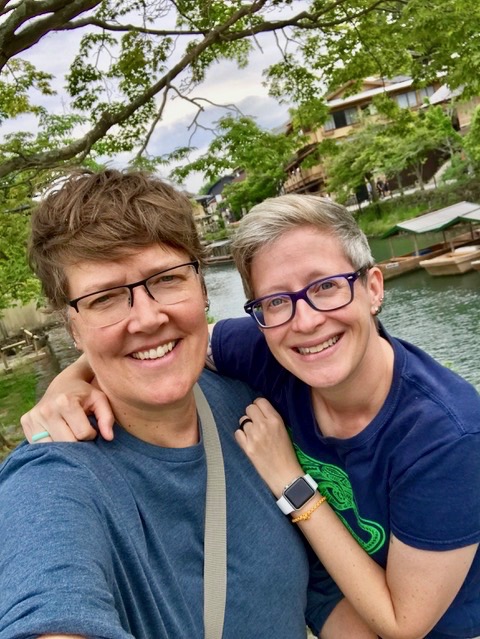
How would you describe your travel style?
A&A: Our current travel style is focused on spending most of the year outside of the US, slow traveling from place to place. And we also spent a total of 41 nights in the US with family and friends in 2019. We aren’t trying to see every site in a city, and we aren’t trying to visit every country on earth. We are living a nomadic life of geoarbitrage, moving from region to region in search of affordable locations we really enjoy living in so that we can return to them again in the future. We make an effort to live like locals to some degree, getting to know our neighbors and cooking for ourselves most of the time. We try to visit some cultural and historical parts of every city, we love to try the local food in every city, and we also take walks in the local parks in every city we visit.
If you could never travel again and could pick any city to be confined to, where would you pick? And why?
A&A: That is a really hard question for us to answer because we are loving our nomad life so much and both feel we have not traveled enough yet. But just for fun we will pretend we are being forced to stay in one city forever and we have to answer by each shouting a response simultaneously. Here goes…
Alison: Kyoto Japan!
Ali: Osaka Japan!
Well, it’s a good sign that we both picked Japan. We just spent a month in Japan this year and we really can;t wait to return. Though as soon as we answered the first time we looked at each other and then we both shouted out a second answer, and while they were both in Scotland this time we still did not pick the same cities. We love Scotland for its landscapes, pride in its history, and of course all of that yummy Scotch Whisky. So we will keep on traveling and try answering this question again next year!
How much stuff do you travel with?
A&A: We started the year with light daybag backpacks for laptops and essentials plus Osprey Porter 46L backpacks for our clothes, and our bags were packed so tight they were bulging. At that point we were assuming we could get by with always meeting carryon requirements when we moved from city to city. Our 46L backpacks met the standard US airline requirements for carryon bags, but in reality the different airlines we used in other countries almost never let us take our 46L bags on planes with us. Besides that we got tired of carrying everything on us when it was time to move, it was too much work and we missed having roller bags. So halfway through the year when we were back in the US visiting family we switched out our bags and now we travel with Osprey Ozone 75L roller bags plus Osprey Nebula 34L backpacks. The 46L bags live at our sisters’ houses packed full of our backup clothes and shoes. And we were happy to get better backpacks for our laptops since we had been using those light daybags since 2013. So now we have bigger bags when we travel but they are not stuffed completely full, though we do have more room for a few kitchen items now!
What’s something you pack that’s not absolutely essential but you like having it?
A&A: Our picnic blanket and cloth napkins. We bought them at a fabric store in France and Alison’s mom sewed the edges of the picnic blanket for us. The picnic blanket is a world map and we add knots of thread to the map for every location we travel to.
Spending
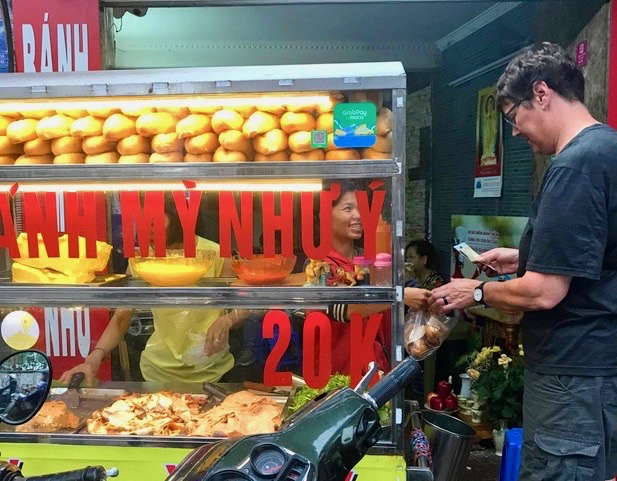
How much money do you spend on travel per year? How many days of travel does this represent? How much does this represent per day and per person?
A&A: We travel 365 days per year, and there’s a bit more detail about our travel spending on our blog: Q3 Update – Geoarbitrage 2019. Here is the breakdown of our total monthly spending, including variable and fixed expenses:
| Spending Category | Monthly amount |
| Accommodation | $1,265 |
| Living expenses (taxes, cell phone, mailbox, storage, Netflix…) | $1,100 |
| Groceries | $405 |
| Dining out / Take-out | $742 |
| Activities | $285 |
| Health Care / Health Insurance | $285 |
| Local Transportation | $300 |
| Global Transportation (from one region to another) | $540 |
| Other expenses (for family members) | $300 |
| Monthly Total | $5,222 |
| Yearly Total | $62,664 |
| Per Person, Per Day Total | $85.84 |
How do you fund your travel (savings/work whilst travelling/other)?
A&A: We fund our nomad lifestyle through dividends and capital gains across our portfolio. We each have a 401k rollover IRA, and we each have a Roth IRA, and we also have a joint brokerage account. Our investments are in index fund ETFs and we follow a simplified allocation using a five-fund portfolio format that we derived from the Bogleheads three-fund portfolio. For more information about our portfolio you can check out our blog: Visualizing Your Money, and Avoiding The RMD Cliff.
Community
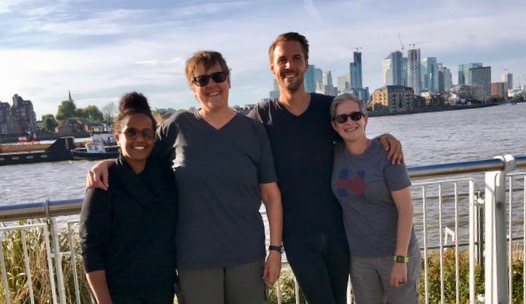
How do you meet people when you travel? Do you have any tips for people that are having challenges meeting people while traveling?
A&A: We reach out to like-minded people we meet on the internet (like you) who are in the FIRE community or full time nomads or both, and make an effort to meet in person if possible. We also bump into vacationers in pretty much every city we visit at parks, cooking classes, restaurants, etc. and strike up conversations with them to start friendships. And we also reach out to locals and expats in our neighborhoods and other places in the cities we visit, and make friends with them as well. We are both big time introverts, so meeting people and making new friends can be a challenge for us, but we are committed to boldly reaching out to people whenever we can. It makes us nervous to reach out to new people but we are meeting wonderful people in every city we visit so it’s worth the little bit of anxiety it gives us. And the best part is that we keep seeing friends we have met as our paths continue to cross when we travel. One couple we met in Thailand we were able to see again in Scotland. Another couple we met in Thailand we saw again in California. Another friend we met in Canada and saw again in London. And we have one friend we have visited with in Paris and London. We look forward to seeing friends we have met on the road in new places
Last but not least
What is one resource (blog, podcast, book besides your own) you recommend for those that want to pursue your lifestyle?
A&A: We were really into the millennial-revolution.com website before we became nomads ourselves because it’s full of nomad destination stories and costs as well. And the book “Quit Like a Millionaire” by Kristy Shen and Bryce Leung (the people behind the blog we just mentioned), is one book that would have changed our lives if we had read it 15 years ago so that’s the first one we recommend to others who are interested in being nomads or reaching FIRE today.
What advice do you have for others who are considering this type of lifestyle?
A&A: In talking to others about the idea of traveling full time we often end up talking about whatever unresolved issues people have in their lives. So we would tell people that a nomadic lifestyle won’t fix something that’s broken in a different lifestyle and we recommend that people focus on any personal or financial issues they have before deciding to become full time travelers.
A&A: Making the switch from prioritizing possessions to prioritizing experiences has been the most life changing thing we have done. Whether you want to travel full time or live in one location, focusing on experiences instead of things is something we’d recommend for anyone.
Rapid Fire Questions
| What is your favorite travel destination & why? | Japan. The food, people, infrastructure, culture, and history. |
| What was the most creative thing you’ve ever done to save money during your travels? | We actually have two from this year: Housesitting – we have booked 5 housesits in 2019 (2 in Thailand, 1 in Ecuador, and 2 in Panama) which have saved us around $3,300 in housing costs for the year. United Airlines Excursionist Fare – we spent 210,000 Chase Ultimate Rewards points and $192 in fees/taxes, saving $4,640 for one trip through 3 regions spread over 5 months of travel. |
| What was your biggest travel mistake? | We typically pay for rental cars with points, and with our last car rental going from Arizona to California we tried a different agency that ended up not allowing our Chase points to cover the one-way fee so we had to pay a couple hundred bucks for that car, which really hurt. |
Thank you Ali & Alison for sharing your story.
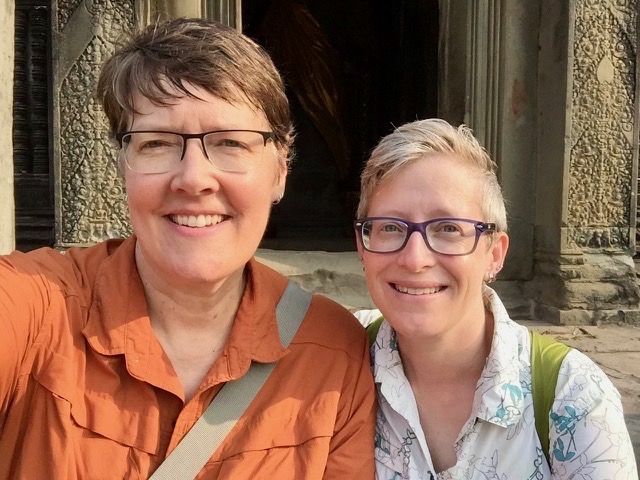
If you want to know more about Ali & Alison, you can find them on the following platforms:
- Blog: AllOptionsConsidered.com
- Facebook: https://www.facebook.com/pg/alix2aoc/
- Instagram:@alloptionsconsidered
- Twitter: @AllOptions_AOC
The Bottom Line
Here are the main lessons we took away from this interview:
- Lesson 1 – “Making the switch from prioritizing possessions to prioritizing experiences” – This is a fundamental key to happiness. Sorry to say but having more stuff won’t make you happy. Here are two reasons why:
- 1) Possessions provide diminishing happiness – When you splurge (ie. you buy for pleasure) on an object you get a big boost in happiness as your brain gets flooded with dopamine. Unfortunately our brain resets our expectations over time so we get a lower dopamine hit with our next purchases (think about people who upgrade their iPhone every year because their perfectly working device isn’t as shiny as the new one). This is commonly known as The Hedonic Treadmill. Experiences are quite the opposite because by definition they are different from each other so our brain doesn’t really get used to them as easily (ie. traveling to a different country each year, trying a new dish/cuisine, hiking a new mountain…).
- 2) Possessions cost more than experience – Whether it is a phone, a car, a boat or a house – possessions aren’t usually cheap in the first place. But they also occur ongoing if you want to keep them (ie. insurance, premium gas, docking fees, roof repairs…). Experience on the other hand can either cost nothing (think hiking, swimming in the ocean, catching up with friends in a park) or have a one time cost. Once the experience is over then you don’t have more cost to incur and if anything you are only left with pleasant memories.
Note: Kristy Shen and Bryce Leung dig deep into the topic of possessions over experience in their book: “Quit Like a Millionaire” that we highly recommend.
- Lesson 2 – “We do not believe that a person has to own a home in order to be a successful adult. The idea that owning a home creates financial stability is false, and the idea that being a renter is a sign of financial instability is also false.” – We believe that having a place we can call home is important but do agree that it should not be attached to any status/success symbol. We actually think that the price of a house is actually inversely proportionally correlated to someone’s happiness because of all the time you will have to spend working just to pay for it and keep it in shape. This is why we plan on enjoying the world through AirBnB for as long as we can.
- Lesson 3 – “In talking to others about the idea of traveling full time we often end up talking about whatever unresolved issues people have in their lives” – We strongly believe that it is far more important that people design the life they want for themselves. As such Nomadic / Slow travel (even reaching financial freedom) isn’t the magic bullet for someone seeking happiness. Seeking internal happiness is a never ending voyage that starts with someone’s self introspection to find where the suffering comes from and finding a way to end it. This isn’t easy and it takes time. This is actually such a profound topic that will need its own dedicated post to do it justice.
Call to action
What do you think about this story? We would love to hear from you, so feel free to share your feedback by leaving a comment below.
Sometimes we need to hear about others making unconventional decisions before we can have the confidence to make our own. If you have (or are on a path to) an unconventional journey to improve your life that has a travel component to it and are interested to share it, please reach out to us as we would love to feature your story.
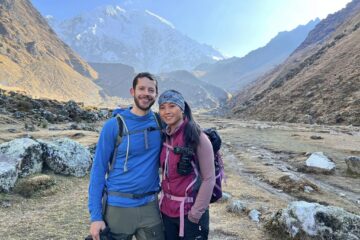
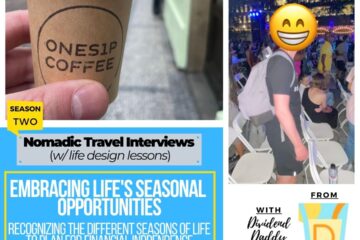
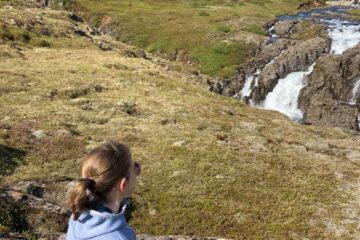
5 Comments
Corey · November 4, 2019 at 1:38 am
Great read! The house sitting sounds great! How did you find that? Is heir a site for that?
Ali Walker · November 7, 2019 at 2:40 am
Yes there are a bunch of different house sitting sites out there for you to choose from. We personally use TrustedHousesitters.com. Their platform is really easy to use and they have a huge membership which means tons of different house sitting opportunities all over the world. We actually have enjoyed house sitting much more than we had expected! It has been a great way not just to save money while traveling, but also to meet really fabulous people in different countries. All of our house sitting hosts have taught us great things about the neighborhoods, cities, and countries they live in which made our travel experiences better. And a few of them have also become great friends!
Skip · November 7, 2019 at 1:36 am
I enjoyed this interview very much. Great questions and answers. I also enjoy the all options considered blog. I have to say that I was very moved by Ali’s story regarding her money background. In fact, I was caught off guard by how moved I was by it. Surprising since I’m generally not a very emotional guy, but it hit home for me in a way I was not expecting. I tried to comment on their blog to thank her for her courage in sharing that story. However, I was having difficulty as it required me to use a WordPress account for some reason (I’m still working on this stuff).
Anyway, I feel really fortunate to be discovering people like you who share our interests. We can’t wait to finally start our travels and hopefully cross paths with you all.
Until then, I hope you and the all options considered crew keep up the good work of sharing this stuff. It is greatly appreciated.
Ali Walker · November 7, 2019 at 2:49 am
Hey Skip – thanks for the great feedback about this interview and the Money Background post as well. I’m so glad that story was meaningful for you. It definitely was a very emotional experience to write that and share it so I really appreciate hearing that it was moving for you.
I’d love to give you feedback about that commenting issue on my blog but I’m not sure what happened! I am also new to this blogging stuff! I know some comments have come in from non-bloggers without WordPress accounts so I’m sorry it didn’t work for you. I hope you will keep reading and try again to comment in the future. 🙂
It’s exciting to hear that you are planning some travels yourself. I’d love to hear more about your plans! We really enjoy meeting fellow travelers in different places so we will cross our fingers that we can cross paths with you as well.
What we learned from interviewing nomadic travelers - Nomad Numbers · May 16, 2020 at 5:06 am
[…] “You don’t need to own a home to be a successful adult.” – Ali & Alison […]